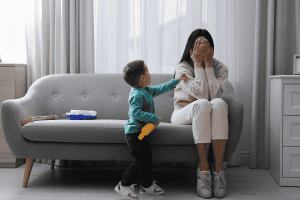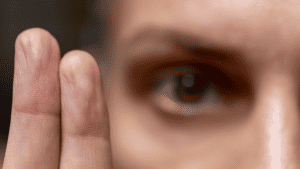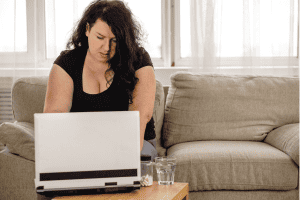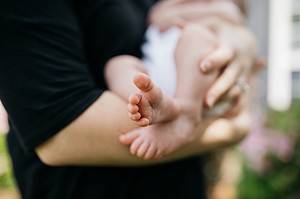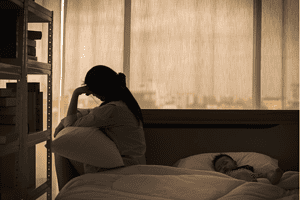How the Cycle of Change can impact New Year’s Resolutions and our capacity to make lasting changes
Have you ever made the decision to make a needed change in your life and really REALLY committed yourself to it, only to find yourself returning to old habits and patterns?
I know I have, and it’s left me feeling deflated, let down… and at times, like a failure. Although I know I’m far from a failure, those feelings still creep in.
Sometimes our want to do or be better, is blocked by things like trauma, grief or even where we are in the Cycle of Change.
What if this year could be different? What if you could start this new year with less anxiety, less rage, and more time being the mother you envisioned being when trauma wasn’t in the way?
In this post, we’ll unpack the Cycle of Change and how it can influence how you make and maintain changes.
The beginning of a new year sees many of us setting resolutions, intentions and goals for change over the coming year. We think about how we want our health, habits and lives to be and pick goals to make these changes happen. Yet, numerous psychological studies have found that of those who set New Year’s Resolutions, less than half of us keep them.
The challenge with seeing through these resolutions (and creating long-term change) has a lot to do with the Cycle of Change.
What I’ve found helpful for myself and my clients is to understand the cycle we all go through in the process of creating change.
What is the Cycle of Change?
The Cycle of Change is a way of describing the 7 phases that we move through on the way to making a change. Each stage has its own tasks and challenges.
By identifying where we are in the Cycle of Change (and which phase we’re moving through), we can understand the accompanying emotions and challenges that come with it. This can help you to move TOWARDS these challenges and emotions, instead of backing away and returning to old patterns.
The 7 phases of the Cycle of Change
Whether you want to get a handle on the anxiety you’re experiencing, work through past traumas, move toward better emotional and physical health, or improve your relationships, understanding where you are in the cycle of change can help.
As you read through the 7 phases, bring to mind an area of your life where change is needed, so you can identify where you’re at.
1. Pre-contemplation
When we are in pre-contemplation, there is no intention of changing the situation or behaviours. Perhaps you’re unaware that a problem exists despite the situation having an impact on you in some way.
In this stage there is a level of comfort in continuing as-is.
Example: “What anxiety? I’m just really busy right now…it’ll get easier.”
2. Contemplation
During contemplation, you’re aware that a problem exists, however there is usually no commitment to taking action to make a change. There is usually fear and resistance present that prevents you from committing to a change.
Example: “I’m feeling really overwhelmed all the time. Maybe I need some help. But I don’t have time right now, or the money…it’ll get easier.”
3. Preparation
Preparation is the stage where you’re aware of the problem and intent on taking action to address it – even if you’re unsure what that action needs to be. You want to make a change.
There can be anticipation at the possibility of change, though anxiety at the journey ahead is still present.
Example: “Ok this isn’t getting easier, I’m not coping. I’m going to find a counsellor and book myself in for next week.”
4. Action
You’re now actively making changes to the factors, thoughts, emotions and behaviours that have been contributing to the problem or challenge.
This may bring discomfort as you discover more about your situation, though there’s also anticipation of the coming changes, as you learn what needs to be done.
Example: Committing to counselling: discovering more about yourself and factors contributing to your anxiety and implementing small changes.
5. Maintenance
You know you’re in the maintenance phase when you’re sustaining the changes that you’ve made and new behaviours, thoughts and emotions replace the old.
Your resourcefulness and focus strengthen as you begin to see the benefits of your efforts (seeing how good the change has been helps you to maintain it).
Example: Daily practice of strategies developed in counselling to manage anxiety symptoms and contributing factors; staying committed to regular counselling appointments for accountability.
6. Relapse
Sometimes we can find ourselves falling back into old patterns of behaviour, thoughts and/or emotions.
This can bring feelings of comfort as you lean into the familiarity of these patterns despite their negative impacts on you. This phase can also bring feelings of confusion and unproductivity.
Example: Drifting from practising the coping strategies or skipping counselling sessions, due to perceived time restraints. Allowing anxiety to creep back in.
7. Internalisation
This phase is where you experience the internalisation and integration of new behaviours and thoughts into your everyday life.
It’s marked by confidence in your ability to sustain the changes and satisfaction in your achievement.
Example: Collaborating with a counsellor to formulate longer-term self-managed plans, reviewing progress, then terminating the counselling relationship.
Having read through the 7 phases of the Cycle of Change, where are you currently in this cycle? What do you need to move to the next stage?
If you’d like some support on how to move to the next step, reach out. I’d love to chat with you about the changes you’d like to make in 2023.

My name is Fiona Rogerson and I am a registered Trauma and Perinatal Perth Counsellor and Childbirth Educator. I work with women and men to overcome emotional and psychological hurdles surrounding birth trauma, childhood trauma, traumatic experiences, as well as conception, pregnancy, postpartum, parenting and identity. I provide clinical supervision, mentoring and professional development training and workshops. I am based south of the river in Perth. To work with me, email at fiona@fionarogerson.com.au or phone 0402 017 425.



